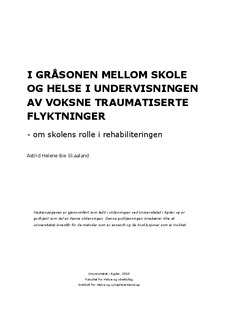| dc.description.abstract | Title: In the grey zone between school and health in teaching traumatized adult refugees – the
school’s role in rehabilitation.
Background
When providing classroom training for the integration of adult refugees, there will always be
individuals that, due to psychosocial problems caused by earlier traumatic experiences, are
unable to follow the normal progress of the rest of the class. This represents a huge challenge
for the educational institution. Based on research on traumas in Denmark, a special education
methodology has been developed, called rehabilitating pedagogics. The following study
focuses on the grey zone between education and psychological therapy using adapted teaching
methodology for this group of traumatized students. The study analyses the rehabilitating
effect of an educational setting, its limits and borders compared to regular therapeutic
interventions, and who is to decide when a student is too traumatized to participate in
classroom training.
Material and method
The empirical data were collected from four different focus-group interviews. These groups
were composed of persons working with traumatized adult refugees: teachers, representatives
from refugee service institutions, representatives from the health sector, as well as a group
composed of persons that came to Norway as refugees or immigrants.
Results
The opinion of all four focus groups was that the school plays an important role, not only in
teaching a new language and in exploring a new society, as required by the government for
permanent residence, but equally in providing a setting for integration and rehabilitation. The
structured education helps organise the day, assists in establishing new social networks,
provides a setting for re-establishing their confidence and trust, and give them experience in
mastering. As such this contributes to re-creating optimism and hope for the future. In this
context the rehabilitation treatment is extended beyond traditional understanding. It was the
opinion of the refugees that rehabilitation could not be separated from the educational setting,
arguably because many cultures have no intermediate classification between normal and
crazy. Knowing how the traumas affect people and the consequences for learning abilities is
of great importance for helping the teachers to master the challenges in an effective way.
Equally important is knowledge about mastering traumas and rehabilitating instruments.
However, in order to achieve the best results, an open dialogue and cooperation between the
therapeutic and educational units is crucial. | en_US |
